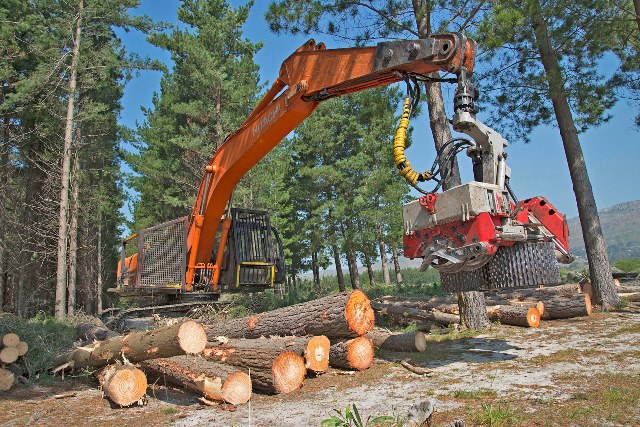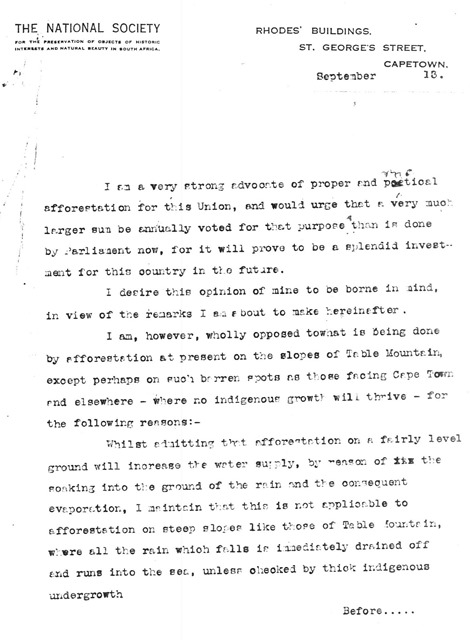SEPARATING THE WOOD FROM THE TREES
SOME of South Africa’s top legal minds will tomorrow, Thursday, tackle critical aspects of a controversy that has raged intermittently for more than 100 years: the presence, and removal, of remnant commercial pine plantations on the Cape Peninsula.
The Peninsula still constitutes a globally significant centre of indigenous biodiversity, and much – but unfortunately not all – of its acclaimed and irreplaceable biodiversity occurs within the Table Mountain National Park (TMNP), which is in turn one of the components of the Cape Floral Region World Heritage Site.
But commercial plantations consisting of alien invasive pine trees have been a feature on the Peninsula since the late 19th century, and large numbers of pines still occur in the Tokai and Cecilia (upper Constantia) sections of the TMNP where they are being progressively harvested – to the delight of botanists and conservationists who want critically endangered indigenous fynbos vegetation restored, and to the dismay of those who like the shade that pines provide during their recreational outings like walking and cycling.
Today, the Supreme Court of Appeal (SCA) in Bloemfontein is scheduled to hear an appeal by SANParks, the statutory authority responsible for managing the TMNP, against a judgment by Judge Pat Gamble in the Western Cape High Court last year. Judge Gamble’s decision effectively pulled the plug on any further harvesting of commercial pines in the Dennedal compartment of the Tokai plantation, pending a new public participation process about pine felling at Tokai.
The appeal, which will determine whether such a public participation process is legally required, has its genesis in two events.
The first was a national Cabinet decision in 1999 to phase out commercial forestry where operations were regarded as no longer commercially viable or environmentally defensible. These so-called “exit areas” included two plantations situated within the TMNP: the Tokai and Cecilia Plantations (usually incorrectly referred to as “forests”).
The second was a devastating wildfire that had swept through the large tracts of the Peninsula and the TMNP in 2015 – including the 600ha Tokai plantation area managed under lease by private company MTO Forestry.
Because the fires severely damaged huge swathes of pines, MTO Forestry successfully applied on business grounds to SANParks in 2016 to accelerate the harvesting of the remaining, undamaged pines.
In terms of the lease, these trees were to have been felled progressively during MTO Forestry’s 20-year lease period that ends in 2025. This would meant that at least some of the pines were to remain standing until then, and could be used recreationally by the public while SANParks implemented its own proposed shade walks and other recreational facilities, as outlined in the TMNP’s 20-year Management Framework over the next decade.
When clear-felling operations started at Dennedal on 30 August 2016, many people were taken by surprise – despite a “stakeholder” meeting organised by the TMNP a week earlier and its release of a media statement – and the intense and emotionally-charged “pines versus fynbos” debate that has waged intermittently since at least 1913 was re-kindled and fanned to a fury.
A newly-formed organisation, Parkscape, successfully launched an urgent application in the Western Cape High Court to stop the felling at Dennedal.
In his judgment on March 1 last year [2017], Judge Gamble interdicted and restrained SANParks and MTO Forestry “from felling any trees in the area of the Tokai Forest described as the Dennendal plantation in accordance with the new [accelerated] felling schedule, unless and until valid and lawful decisions to that effect are taken”.

The judge pointed out that Parkscape had not claimed a legal right for its members or the public to walk in the shade of pine trees, but he agreed with its argument that SANParks had acted unfairly by not adequately informing it about plans for the accelerated felling.
SANParks is relying on a team led by legal luminary, advocate Jeremy Gauntlett SC, to present its appeal in Bloemfontein
Parkscape is the second respondent and its legal team is headed by advocate John Newdigate SC, who successfully represented it during the original High Court proceedings in Cape Town.
MTO Forestry, the first respondent, is not opposing the appeal.
In its Heads of Argument, SANParks says the case turns on whether the public had the right to be consulted when TMNP managers considered and approved the request by MTO Forestry – made in terms of the lease – to accelerate the harvesting of pine compartments at Tokai and Cecilia.
It points out that the national government assigned the MTO Forestry lease in respect of the two plantations to SANParks in 2005, and that this assignment was “premised on the fact that a considered decision had been taken to phase out commercial forestry at Tokai and Cecilia. In its nature the decision was final – and expressly so conveyed to the public. The assignment was to enable SANParks to rehabilitate and restore the areas to their former natural state. This is recorded in the conditions of the assignment.”
The 20-year pine felling schedule as set out in this 2005 contract was not rigid but could be varied by agreement between the two contracting parties, it argues.
“In short, SANParks contends that the MTO lease – and specifically here, rights and obligations of SANParks regarding the scheduling of felling – attracted no duty to consult the public before SANParks (pursuant to rights accruing under that contract) rescheduled with its counterparty, MTO, the felling... There was no express promise to the public.”
Parkscape’s argument is that because SANParks’ decision to approve MTO’s request for accelerated harvesting of pine trees at Dennedal adversely affected the rights or legitimate expectations of Parkcape, its members and the public, the national parks authority should have first engaged in “proper consultation” with them. This was not done.
The basis for this argument is that the decision of SANParks constitutes administrative action as defined in the Promotion of Administrative Justice Act (PAJA), because SANParks is an organ of state that performs public functions and has pubic powers in terms of the National Environmental Management: Protected Areas Act (NEMPAA) and the National Forests Act.
And because the felling decision constituted administrative action, PAJA demanded that such a decision had to be “procedurally fair” and – “in particular” – SANParks had been obliged to first consult with Parkscape and its members and with the general public before taking that decision.
Parkscape also argues that SANParks’ decision constitiuted a “fundamental departure” from the statutorily approved Management Framework for the Table Mountain National Park.
Published in December 2007 after “significant public consultation” and concluded in 2009, this Framework “represented a compromise by those who wished to retain pine trees in the Tokai forest (sic), on the one hand, and those who wished to remove the pine trees and replace them with fynbos, on the other,” Parkscape says.
SANParks counters by arguing that its decision to approve MTO’s request does not fall within PAJA’s definition of administrative action, and that there was therefore no duty to consult as the decision did not, as PAJA requires, affect the rights or legitimate expectations of anyone.
“There was no legitimate expectation,” SANParks argues, and continues:
“Parkscape’s interpretation of the Management Framework (which was upheld by the [original] Court) will spell disaster for the restoration of the Cape Flats Sand Fynbos. This interpretation will fundamentally undermine biodiversity objectives, which runs contrary to the Framework’s main purpose.”
 The first page of a six-page lobby letter to the Cape Parliament in September 1913 by Henry Cloete, owner of the Alphen Estate, about the adverse impacts of afforestation on Table Mountain and the Peninsula. (Courtesy of Trustees of the Alphen Archive)
The first page of a six-page lobby letter to the Cape Parliament in September 1913 by Henry Cloete, owner of the Alphen Estate, about the adverse impacts of afforestation on Table Mountain and the Peninsula. (Courtesy of Trustees of the Alphen Archive)

